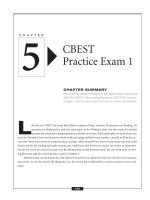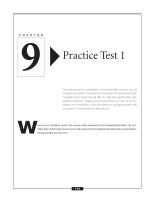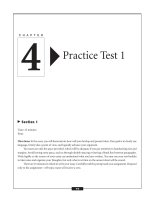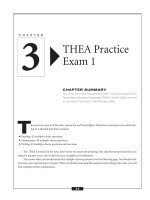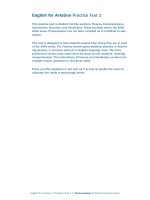ADJECTIVES – ADVERBS – COMPARISON – FURTHER PRACTICE
Bạn đang xem bản rút gọn của tài liệu. Xem và tải ngay bản đầy đủ của tài liệu tại đây (264.11 KB, 8 trang )
English
ADJECTIVES – ADVERBS – COMPARISON – FURTHER PRACTICE
Exercise 1. Complete the sentences using the words in bold. Use two to five words.
1. Wouldn’t you prefer to get a takeaway rather than have to cook tonight? (sooner)
→Wouldn’t you _______________________________have to cook tonight?
2. If we stay longer, we can spend more time sightseeing. (the)
→ The _______________________________time we can spend sightseeing.
3. I’d rather go home than go to the cinema. (than)
→I’d prefer _______________________________go to the cinema.
4. In some countries men and women are paid the same. (as)
→In some countries women _______________________________ men.
5. Crisps are not as nutritious as nuts. (less)
→Crisps _______________________________nuts.
6. No other job is as well-paid. (best)
→It _______________________________job.
7. John and I have received the same number of job offers. (many)
→I have received _______________________________John.
8. Last night I felt more tired than ever. (as)
→ I have _______________________________I did last night.
9. Tony finds history easier than geography. (not)
→Geography _______________________________history for Tony.
10. As he gets older, he becomes less tolerant. (the)
→The _______________________________tolerant he becomes.
11. I love going to football matches but my sister prefers going to tennis tournaments. (whereas)
→ I love going to football match _______________________________to tennis tournaments.
12. Helen had twice as much work as Janet. (half)
→Janet had _______________________________Helen.
13. I like being self-employed. It’s better than working for someone else. (to)
→ I prefer _______________________________for someone else.
14. My grandfather is getting less and less patient as he gets older. (impatient)
→My grandfather is getting _______________________________as he gets older.
15. Laura is a less sensitive girl than her sister. (such)
→Laura isn’t _______________________________her sister.
16. Airships are not dangerous as they used to be. (than)
→Airships _______________________________they used to be.
17. My father is spending less time at the office now he’s nearing retirement. (as)
→My father is _______________________________at the office now that he’s nearing retirement.
18. Martha and Julie have the same views. (as)
→Martha’s views _______________________________Julie’s.
19. I think I would prefer to leave rather than wait until he comes. (sooner)
→ I think I _______________________________until he comes.
20. If we climb higher, the view will be better. (the)
→The _______________________________the view will be.
Exercise 2. Fill in “as” or “like”
1. _____ you mentioned, they are _______ two peas in a pod. Jack looks exactly _______his twin
brother Jim. They even have the same personality _______each other.
High School for Gifted Students - HNUE
Page 1
English
2. Ugh! This soup tastes just _______water. Didn’t you make it _______I told you?
3. He treats his friends _______dirt. I detest people behaving _______that. He should treat people
_______he’d like to be treated himself.
4. _______he didn’t know what his relations looked _______, they sent him a photo so he would
recognize them at the airport.
5. I have been working _______a tour guide for two years now, but I don’t really regard it _______a
serious career. It’s time to do something different. I might even go back to college _______my sisters
had done.
6. _______usual it looks __________if it’s going to rain. It’s no wonder Lancashire is described
_______the wettest county in Britain.
7. He drinks _______a fish and smokes _______a chimney and, _______we all keep telling him, he
won’t live long.
8. _______much _______ I admire his work, I don’t think he deserves to be known _______the
greatest novelist of the century.
Exercise 3. Complete the sentence using the words in bold. Use two to five words.
1. Unfortunately we couldn’t find a better solution in the time available. (best)
→ Unfortunately it _____________________________________ we could find in the time available.
2. Spanish and Portuguese are said to be alike. (similar)
→Spanish is _____________________________________Portuguese.
3. I’ve never eaten such a hot curry. (the)
→ It’s _____________________________________I’ve ever eaten.
4. She is extremely disrespectful to her colleagues. (way)
→She behaves _____________________________________to her colleagues.
5. Sheila
is
not
as
talented
as
her
sister.
(less)
→Sheila
is
_____________________________________her sister.
6. She was the best prepared of all the candidates. (than)
→ She was _____________________________________all the candidates.
7. As prices increase, the cost of living becomes higher. (the)
→The _____________________________________the cost of living becomes.
8. She writes very creatively. (creative)
→She _____________________________________writer.
9. George made the same number of mistakes as Peter. (as)
→George made _____________________________________Peter.
10. It’s more expensive to live in London than in Liverpool. (not)
→It’s ____________________________________to live in Liverpool as in London.
11. MacMahon is the most skillful player in the team. (as)
→No one else in the team _____________________________________MacMahon.
12. The seller wouldn’t accept a lower offer. (lowest)
→It was _____________________________________the seller would accept.
13. She’s the most eccentric person I’ve ever met. (never)
→I’ve _____________________________________eccentric person.
14. As she gets richer, she becomes more extravagant. (the)
→The _____________________________________extravagant she becomes.
15. We’ve never had such a heated argument before. (most)
→ It _____________________________________we’ve ever had.
16. The boss is very friendly to her staff. (way)
→The boss behaves _____________________________________to her staff.
17. She received the same number of gifts as her cousin on her birthday. (many)
→ She received _____________________________________her cousin on her birthday.
18. He speaks German fluently, because he was born in Germany. (a)
→ He ____________________________________, because he was born in Germany.
Exercise 4. Find the word which should not be in the sentence.
1. She is more prettier than her sister.
2. This film is as more exciting than the one we saw last week.
3. This is the more best meal I’ve had in a long time.
4. As time went by he became so more and more restless.
High School for Gifted Students - HNUE
Page 2
English
The more earlier we leave, the sooner we’ll get there.
We hardly not go anywhere these days.
This coat is very cheaper than the one Sue bought.
Sarah is the more polite than her sister.
This necklace is twice as more expensive as that one.
I’d rather do my homework tonight than to leave it for tomorrow.
It sounds as like a fire engine to me.
Very most people seem to be in favor of the decision.
No one else I know is as selfish as like Julia.
He is regarded as like the best film director of the decade.
No other secretary is as much efficient as she is.
You should treat people just so as you would like to be treated.
She invested the most of her money in shares.
This periodical has much interesting articles about wildlife conservation.
This play is similar as to his last one.
She’d sooner than forget about it.
Exercise 5. Complete the table.
Adjective
Verb
Noun
Adjective
Verb
Noun
strong
strengthen
1.___________
8. ___________ achievement
prosperous
2.___________ 3. ___________ 9. ___________
culture
optimistic
4. ___________ 10. __________
architecture
threatening
5. ___________ 6. ___________ declining
decline
11. __________
7. ___________
economy
solve
12. __________
Exercise 6. Read the text below. Use the word given in brackets to form a word that fits in the space.
KRAKOV
In the past, Krakov was a city of great political (0. important)____________. It was the ancient
capital of Poland and the official (1.resident) ____________of the country’s kings. The city sill has
(2.impress) ____________medieval architecture, and is listed by UNESCO as a world heritage site because
of its great (3.history) ____________and artistic (4.significant) ___________. Krakov had the largest
square in medieval Europe and this is still the (5.commerce) ____________centre of the city, and the best
place to begin your (6.explore) ____________of the winding streets of the old quarter. These streets were
home to Poland’s (7.great) ____________artists, writers and thinkers, many of whom studied at the city’s
(8.fame) ____________university. The area still has a (9.romance) ____________atmosphere and it’s a
pleasure just to wander round. But there is also plenty to do and see as a thriving ( 10. culture)
____________life continues today.
Exercise 7. Complete the sentences with the correct word.
1. good/well
A. You don’t look very __________. Are you feeling Ok?
B. Ask Sue what this word means – her Italian is really __________.
2. steady/steadily
A. Since 1990, there’s been a __________increase in tourism to this town.
B. Over the past 20 years, the quality of hotels has __________improved.
3. late/lately
A. There have been a lot of strikes at the airport __________.
B. The announcement said that the plane would take off __________.
4. hard/hardly
A. Sarah was so suntanned I could __________recognize her.
B. I worked extremely __________to pay for this holiday.
5. wide/widely
A. Can you close the window? It’s __________open at the moment.
B. Mark travelled __________in Europe when he was a student.
6. direct/directly
A. We can fly __________to Rome from this airport.
B. If you lose your passport, you should go __________to the police.
Exercise 8. Complete the second sentence so that it has a similar meaning to the first one, using the
word given. You must use between two and five words, including the word given.
5.
6.
7.
8.
9.
10.
11.
12.
13.
14.
15.
16.
17.
18.
19.
20.
High School for Gifted Students - HNUE
Page 3
English
1. A lot of snow fell yesterday in Vienna. (hard)
→It ___________________________________ in Vienna yesterday.
2. There has been a steady increase in prices over the last year. (steadily)
→Prices ___________________________________over the past year.
3. My hometown is a fairly big industrial city. (quite)
→My hometown is ___________________________________industrial city.
4. Prague is rather expensive. (bit)
→Prague is ___________________________________expensive city.
5. I have almost no money left after my holiday. (hardly)
→I have ___________________________________money left after my holiday.
6. The number of tourists I saw was really amazing. (absolutely)
→ I ___________________________________the number of tourist I saw.
7. Can I fly to Bratislava without having to change planes? (direct)
→Is there ___________________________________to Bratislava?
8. Keith really lost his temper when they told him to show his passport again. (extremely)
→ Keith ___________________________________when they told him to show his passport again.
Exercise 9. Read the text below and think of the word which best fits each space. Use only ONE word
in each space.
EVERY PICTURE TELLS A STORY
More (0.)_______230 years after his death, the Venetian painter Canaletto is helping to save his
beloved city. Scientists (1.) _______discovered that his highly accurate paintings of eighteen-century Venice
provide (2.) _______with a record of sea levels a century and (3.) _______half before modern
measurements began. They hope that this information will help them to save Venice and its rich cultural
heritage from being lost beneath the waves.
(4.) _______Venice is built on a lagoon, it is highly vulnerable to the changing sea levels brought on
(5.) _______global warming. High tides often flood the city. As well as causing problems for residents, this
means that sea water gets into the buildings and it has begun (6.) _______rot them away.
Instruments were first used to measure sea levels in 1872, and scientists have (7.) _______looking
for ways to find (8.) _______what happened before then, as this could help them predict what might happen
in future. Then somebody realized that Canaletto, unlike most modern painters, painted exactly (9.)
_______he saw, so his pictures are almost (10.) _______accurate as photographs. If you look at them
closely, you can see a brown-green line on the buildings (11.) _______marks the average high-tide level at
the time. The scientists can therefore see that the sea level in Venice has risen by about 2.7 millimetres per
year (12.) _______Canaletto’s day.
Exercise 10. Read the text and give the correct form of the word in brackets.
There’s an (0.write)__________ law that says teenagers find the life difficult. I found being a
teenager (1.possibility) _________. My parents seemed to (2. approval) __________of everything I did.
They said I was (3. enthusiasm) __________and lazy. But really I was just bored and shy. I felt (4.
comfort) __________with girls, (5.special) __________the ones I really liked. I remember looking in the
mirror one morning and my face was totally (6. recognisable) __________. The day before I’d been quite
good-looking. Now I was (7. attraction) __________and my face was covered in spots. I thought to (8. self)
__________, “Now I’m going to be even more (9.popularity) __________.” I just wanted to (10.
appearance) __________, and I remember being so (11. patience) __________to be an (12. dependent)
__________adult- to leave home, get a job and earn some money. To be able to go where I wanted, when I
wanted, with (13. body) __________telling me what to do. For a while, I was (14. believable)
__________unhappy. But only for a while. Then the spots went away, I fell in love, I realized my parents
weren’t the enemy and suddenly I didn’t (15. like) __________being a teenager after all. In fact, I had a
great time.
Exercise 11. Put these words under the correct heading according to the prefix they take. Some words
can go under more than one heading.
appear iron
believable lead
logical prison mature accessible polite
resistible
regular continue sensitive
material smoker literate trust
timely
expected conclusive
dis-
il-
im-
High School for Gifted Students - HNUE
in-
Page 4
ir-
non-
mis-
un-
English
Exercise 12. Put these words under the correct heading according to the suffix they take. Some words
can go under more than one heading and you ma have to change the spelling slightly.
photocop count judge
time
emerge emancipate rude employ dramatise frequent
y
argue
calm
recommend speech deceit
care
point respect tend
rely
-able
-ation
-ency
-ful
-ly
-less
-ment
-ness
Exercise 13. Complete the sentences using the words given in bold. Use two to five words.
1. Richard isn’t too young to ride a motorbike. (old)
→ Richard __________________________________________ a motorbike.
2. In general, women are shorter than men. (as)
→ In general, men __________________________________________women.
3. I can’t wait to go on holiday. (forward)
→ I’m really __________________________________________on holiday.
4. Prices may go up next year, so you should buy now. (case)
→ You should buy now __________________________________________next year.
5. Mark does not run as fast as he did. (used)
→ Mark __________________________________________he does now.
6. They sunbathe all day long when they were on holiday. (spent)
→ They __________________________________________when they were on holiday.
7. Helen hasn’t tried Japanese food before. (time)
→ It’s the __________________________________________Japanese food.
8. She’d rather watch tennis than football. (prefers)
→ She __________________________________________football.
9. The police managed to catch the bank robbers after a three-day chase. (catching)
→ The police _______________________________________the bank robbers after a three-days chase.
10. Can’t he do any better than this? (the)
→Is __________________________________________he can do?
11. I don’t know all the facts. (aware)
→I __________________________________________all the facts.
12. Whose fault was the fire at the factory? (blame)
→ Who __________________________________________the fire at the factory?
13. He came here three months ago. (been)
→He __________________________________________three months.
14. They decided to cancel the wedding. (off)
→ They __________________________________________the wedding.
15. He crossed the street because he didn’t want to speak to her. (speaking)
→He crossed the streets __________________________________________to her.
16. His father doesn’t want him to drink spirits. (disapproves)
→ His father __________________________________________spirits.
Exercise 14. Fill in the correct preposition.
High School for Gifted Students - HNUE
Page 5
English
1. I don’t know the result _____ my exams yet.
2. He made a lot of mistakes resulting _____his
14. She has
a good relationship _____her
children.
15. I find it hard to sympathize _____Denise.
inexperience.
3. Her arrogance resulted _____her losing all
16. She’s not very sympathetic ______ the poor.
her friends.
1. James was suspected ______starting the riot.
4. I am obliged _____you _____all your
2. Poor Jill suffers ______hay fever.
invaluable assistance.
3. She spends a lot of money ______cosmetics.
5. Was he really involved _____the incident?
4. I’m sorry ______forgetting our anniversary.
6. You can lean _____me.
5. She’s very sorry ____the state of the house.
7. The ladder was leaning _____the wall.
6. The manager was not satisfied ____his staff.
8. The guest apologized _____the hostess
7. That’s the same car ______mine.
_____staining the sofa with wine.
8. What are you so excited ______?
9. Some people are deliberately cruel
9. South Africa is a country rich ______gold.
_____stray animals.
10. Kindly refrain ___throwing litter in the park.
10. There are big differences _____the two
11. I’m writing ______reference to your letter.
cultures.
12. Don’t refer ______his recent dismissal.
11. Claire is familiar _____the procedure.
13. It’s no use trying to reason ______her.
12. That man seems familiar _____me; I must
14. There was no reason __him to shout like that.
have seen him before.
15. He spends a lot of time ______updating his
13. You can’t deny there is a relationship
stamp collection.
_____crime and poverty.
Exercise 15. Read the text below and think of the word which best fits each space. Use only one word
in each space.
CHOOSE YOUR SPORT CAREFULLY
Regular exercise such (0.)_______ jogging or swimming is good (1.) _______the heart. It can also
give you more energy to enjoy life. As a (2.) _______of regular exercise, your body gets better (3.)
_______using oxygen. It becomes easier for your heart to pump blood (4.) _______your body. After a while,
the heart doesn’t (5.) _______to work quite as hard. Exercise is often thought to be an easy (6.) _______of
losing weight. But in (7.) _______, exercise tends to increase your appetite. Many people discover they lose
(8.) _______weight with exercise alone. (9.) _______diet and exercise are needed to achieve this. Some
people exercise because they think it will help them to live longer. If that is your reason for exercising, then
you (10.) _______avoid short, intensive exercise. Squash, for example, (11.) _______is a fast game, may be
harmful (12.) _______you’re unfit or middle-aged. Other sports can be dangerous (13.) _______. Although
both rugby and football are popular sports, a rugby player is three (14.) _______more likely to be injured
than a tennis player. It is advisable, (15.) ______, to choose a sport that suits you and not one that is going to
harm you.
Exercise 16. Use the word in brackets to form a word that fits in the space in the same line.
FORESTS
One third of (0. west)_______ Europe is covered by trees. This sounds (1. impress) _______, but
most of these trees were planted recently and are no (2.replace) _______for the ancient natural forests.
Europe’s ancient woods are (3.suit) _______habitats for a large number of (4.endanger) _______species.
Fast-growing modern forests, however, are dark and (5.inviting) _______to birds and animals. The
Worldwide Fund for Nature recently held a seminar to increase (6. public) _______for a new campaign
called “Forests for Life”. The (7. organize) _______wants to introduce bans on trade in (8. produce)
_______made from wood from these forests. By the year 2000, they hope to have built up a network to
provide (9.protect) _______for (10. exist) _______areas and help restore damaged forests.
Exercise 17. Complete the sentences below with a suitable word or words from the box.
a brush
brass
a bat
a feather
a church mouse
life
gold
a fiddle
clockwork
two peas in a pod
1. Old Mr Higgins is as fit as _______________. He still jogs ten miles every morning.
2. She gets up at six every morning as regular as _______________.
3. My suitcase feels as light as _______________. I must have forgotten to pack something.
4. I wouldn’t take any notice of anything he says. He’s as daft as _______________.
5. My dad is as blind as _______________without his glasses.
6. I thought John was abroad, but he turned up at the meeting as large as _______________.
7. The twins are as alike as _______________. Nobody can tell them apart.
High School for Gifted Students - HNUE
Page 6
English
8. She marched to the front of the queue as bold as ____________and demanded to be served at once.
9. The children were as good as _______________. I didn’t hear a peep out of them all night.
10. Even though Mrs Kelly is as poor as _______________she still gives money to charity regularly.
Exercise 18. Read the text and choose the best answer for each question.
CARRY ON LEARNING
Everyone, whatever their age, can share in the joy and fulfillment of learning, as June Weatherall
found out.
When I first retired, I thought I’d love spending more time on the gardening, needlework, and other
creative activities I’d found so relaxing after my demanding job. But it didn’t turn out that way, I found that
I didn’t want, or need, that kind of relaxation anymore, I wanted to stimulate my mind instead. Also, they’re
all solitary activities and I missed the company and interests of my old work companions.
So with a couple of friends, I went along to an art appreciation evening class at our local regional
college. It was wonderful, but only lasted a year. At the end, I asked my tutor, “What’s next?” He suggested I
attend his history of art access course.
“Whatever’s that?” I asked. The college had an open evening coming up, so I went along to find out.
A full-time access course takes one year and gives you access to university if, like me, you left school
without any qualifications, and it’s free if you do it full-time. I only wanted to do the art history bit, but even
so, with my pensioner’s discount, it would cost a mere $30 per term.
Lyn, who organizes the courses for the college, was enthusiastic. “Why don’t you do the whole
course? You could start in the spring term with art history, do another module in the summer, then go fulltime in the autumn and do all the subjects.” It sounded wonderful, but wasn’t I a bit old, at 63, to start being
a student? A definite “no”. One of the students that year was 82. That clinched it. It must be worth having a
go.
“The art history part of the course, which I’ve just completed was stimulating and involved a trip to
the Louvre museum in Paris – which was wonderful. The tutors are enthusiasts and infect us all with their
enjoyment of the subjects they teach. “Lively” would be the word to describe the classes. My fellow
students, who are also doing subjects like psychology, maths, biology, etc.. are good company. They’re
mainly people in their thirties with children, taking a second bit at the educational cherry. There’s a crèche to
help those with toddlers and an excellent library. They’re kind enough to say they find the older students
offer a lot in experience – they certainly give a lot to us in newer ways of looking at things. One, a nurse, is
changing direction and has a place at Anglia University to do a degree course in art history. Another has
been accepted to do English.
We have homework and have to do an essay each term for each subject, and sit exams. For art
history, I opted to write about the Bauhaus – a college for all the arts set up in Germany in the early
twentieth century. The last essay I’d written had been a lifetime ago – in 1995 – so I was a bit apprehensive,
but I managed fine. We also had to produce a journal about all the painters we’d learnt about –which was
fun, but rather time-consuming. Occasionally, I envy the more typical mature students, who just do courses
for pleasure and don’t have to do exams or essays as I do, but really I’m a very happy lady. There are
drawbacks, however. The main one is you have to make a commitment. During term time, you can’t just
drop everything and go out for the day if the sun shines – one of the supposed joys of retirement.
Will I go on to university if I’m successful? I’ll see how next year goes. Meanwhile, exercising my
brain cells is working well for me. I feel alive. The garden’s getting a bit out of control, but that’s the least of
my worries!
1. What did June discover when she first retired?
A. She had more free time than she expected.
B. She had not really been very happy in her job.
C. She needed activities she could do on her own.
D. She no longer found her old hobbies satisfying.
2. What first attracted June to the “access course”?
A. Some of her friends were doing it.
B. She knew somebody who taught on it.
C. She’d decided she wanted to study full-time.
D. Pensioners who did it were offered a discount.
3. The word “clinched” used in the passage means ______.
A. made up my mind for me.
B. put me under pressure to decide.
C. made me reconsider my decision.
D. left me unsure what to do next.
4. What does June say about the teachers on the access course?
A. They are very patient with the more mature students.
B. They need to know a lot about a wide range of subjects.
C. They appear to be genuinely interested in what they teach.
D. They have problems dealing with a variety of students.
High School for Gifted Students - HNUE
Page 7
English
5. What does “one” used in the passage refers to?
A. A subject June has to study
B. a student on the course June is doing
C. a new way of approaching art history
D. an experience June can share with others.
6. When June had to write an essay, _________
A. she wrote about a college she had once attended. B. she rewrote one she had written years ago.
C. she wasn’t allowed to choose the subject.
D. she found it easier than she had expected
7. What disadvantage of the access course does June mention?
A. It tends to limit her freedom in some ways.
B. It attracts students who are not really committed.
C. It involves keeping a journal which is rather boring.
D. It doesn’t give her the opportunity to take exams.
8. From the last paragraph, we understand that June is __________.
A. anxious about her garden
B. determined to take a degree
C. enjoying what she’s currently doing
D. unsure whether studying is really for her
Exercise 19. Read the text carefully. Some of the lines are correct and some have a word which should
not be there. If a line is correct, put a tick (√) in the space provided. If a line has a word which should
not be there, write it in the space provided.
Exam worries
1. There’s a teaching exam I want to take next
1. year but I’m very cautious about applying it.
2. In the first place, the pass rate isn’t high up;
3. in fact only a fifty percent of candidates actually
4. pass. Secondly, it’s very expensive to do the
5. course and exam. It costs at $1,500 and
6. you need to take three months off the work.
7. Thirdly, it’s quite so stressful. Before you can
8. sit the final practical and written exams you
9. must have been written ten compositions and
10. have had ten lessons observed which are
11. being considered to have been of a high enough
12. of standard. In addition to all these points,
13. I want to make certain I have enough of the
14. right kind of teaching experience to pass through
15. before I attempt the exam. It’s lots of much
16. money to waste if you’re not all sure of passing.
High School for Gifted Students - HNUE
Page 8
